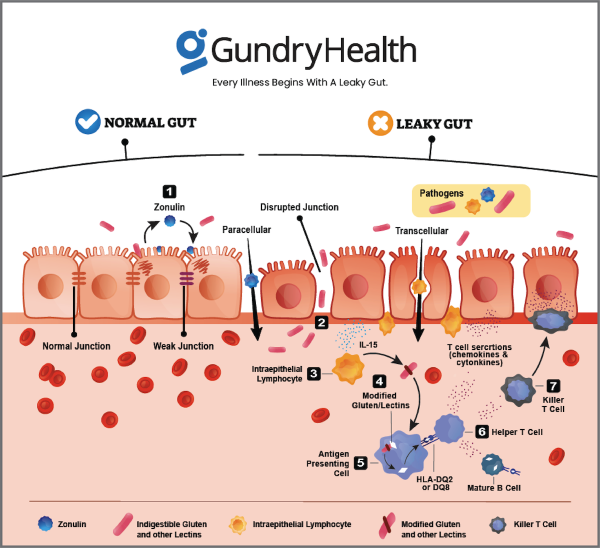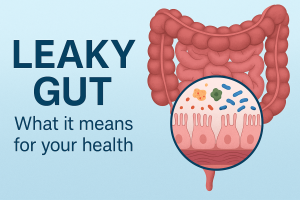Gastroesophageal Reflux Disease: How This Digestive Condition Leads to Autoimmune Disease
Gastroesophageal reflux disease (GERD) is a common digestive condition that affects millions of people worldwide. It occurs when the lower esophageal sphincter, a muscular valve that separates the stomach from the esophagus, fails to close properly, allowing stomach acid to flow back into the esophagus. This can cause symptoms like heartburn, chest pain, and difficulty swallowing. However, GERD is not just a nuisance – it can also lead to serious health problems, such as autoimmune disease.
Understanding the Link Between Gastro-Esophageal Reflux Disease and Autoimmune Disease
Characterized by the backflow of stomach acid into the esophagus, GERD can cause a range of symptoms like heartburn, chest pain, and difficulty swallowing. However, recent studies have also linked GERD to autoimmune disease, a condition where the immune system mistakenly attacks the body’s own healthy tissues.
Leaky Gut Syndrome and Connection to Gastro-Esophageal Reflux Disease
In the world of health, a condition called leaky gut syndrome is becoming more relevant to most diseases. Leaky gut syndrome is where the lining of your intestines becomes damaged by an unhealthy diet. This allows undigested food particles, toxins, bacteria, and other harmful substances to leak into your bloodstream, triggering an immune response as your body tries to defend itself. However, this chronic inflammation can take a toll on your tissues and organs over time.
Making Hard, Easy.
Remarkably, leaky gut syndrome serves as a common factor in many autoimmune diseases, including rheumatoid arthritis, lupus, multiple sclerosis, psoriasis, and GERD-related esophageal disorders. Autoimmune diseases occur when your immune system mistakenly attacks your own healthy cells and tissues, leading to a wide range of symptoms and complications. This confusion arises from molecular mimicry, where substances leaking from your gut bear similarities to your own tissues, confusing your immune system and prompting attacks on both.
For example, lectins are a type of protein found in many plant foods, such as grains, legumes, nightshades, nuts, seeds, and dairy products. Lectins can cause leaky gut syndrome by binding to your gut lining and breaking down the tight junctions that hold it together. Lectins also resemble some of the proteins found in your esophagus, such as collagen and elastin. So when lectins leak into your bloodstream, your immune system may attack your esophagus as well. This can lead to GERD-related esophageal disorders such as Barrett’s esophagus or esophageal cancer1
GERD Cause
Researchers have identified several mechanisms by which GERD may contribute to the development of autoimmune disease. One is the presence of refluxed stomach acid, which can cause inflammation in the esophagus and prompt an immune response. Over time, chronic inflammation can lead to tissue damage and the production of autoantibodies, which are antibodies that mistakenly attack the body’s own tissues. This can ultimately trigger the onset of autoimmune disease.
GERD can affect your diet and lifestyle choices, which can also impact your gut health. Foods, such as lectins (a type of protein found in many plant foods), gluten (a protein found in wheat), dairy products (milk), soy products (tofu), sugar (candy), or spicy foods (chili) can trigger GERD. These foods can also cause or worsen leaky gut syndrome by irritating your gut lining or feeding the bad bacteria in your gut.
In addition to this direct mechanism, GERD may also indirectly contribute to autoimmune disease through its effects on the gut microbiome. The gut microbiome refers to the trillions of bacteria that inhabit our gastrointestinal tract, playing important roles in digestion, immune function, and metabolism. Studies have shown that people with GERD have less diverse gut microbiomes and higher levels of potentially harmful bacteria. These changes can trigger an immune response and contribute to the development of autoimmune disease.
Furthermore, many people with GERD resort to medications or surgeries to manage their symptoms or improve their esophageal function. However, these treatments can also have negative effects on your gut health. For example,
- Antacids can neutralize stomach acid but can also reduce your digestion and absorption of nutrients and increase the risk of bacterial overgrowth or infection in your gut.
- Proton pump inhibitors (PPIs) or H2 blockers can reduce stomach acid production but can also impair your digestion and absorption of nutrients and increase the risk of bacterial overgrowth or infection in your gut.
- Antibiotics can kill off infections but can also destroy the good bacteria in your gut and increase the risk of fungal overgrowth or antibiotic-resistant bacteria.
- Surgeries such as fundoplication or esophagectomy can restore esophageal function but can also cause trauma to your intestines or introduce infections into your abdominal cavity.
How To Diagnose and Treat GERD and Leaky Gut Syndrome?
GERD and leaky gut syndrome can be difficult to diagnose, as they can cause a variety of symptoms that can be mistaken for other conditions. To make a diagnosis, your doctor will need to take a detailed medical history, perform a physical examination, and order some tests to confirm your condition. These tests may include:
- Blood tests to check for inflammation, hormones, antibodies, or infections
- Urine tests to check for toxins or infections
- Stool tests to check for parasites, bacteria, or yeast
- Food intolerances
- Endoscopy or biopsy to check for esophageal damage or inflammation
While the link between GERD and autoimmune disease is still being studied, there are several treatment options that can help manage the symptoms of both conditions. For GERD, lifestyle modifications like eating smaller meals, avoiding trigger foods and drinks, and losing weight can help reduce symptoms. Medications like antacids, proton pump inhibitors (PPIs), and H2 blockers can also help neutralize stomach acid and increase the effectiveness of the lower esophageal sphincter, a muscular ring that prevents acid reflux.
The treatment of GERD and leaky gut syndrome depends on the severity and cause of your condition. Some of the possible treatments include:
- Medications or supplements to reduce inflammation, regulate hormones, balance gut bacteria, or heal the gut lining
- Dietary changes to eliminate foods that cause leaky gut syndrome or GERD symptoms and to include foods that support gut health and esophageal health
- Lifestyle changes to reduce stress, improve sleep, exercise moderately, and avoid toxins or infections
- Surgery to restore esophageal function if medications or other treatments fail or if esophageal damage is severe
How To Prevent or Heal GERD and Leaky Gut Syndrome with Diet and Lifestyle Changes at Gundry Health?
For autoimmune disease, treatment options depend on the specific condition and may include medications that suppress immune activity, like corticosteroids, and immunomodulatory drugs, like methotrexate and biologic therapies. Lifestyle modifications like regular exercise, stress management, and avoiding triggers like certain foods or environmental toxins may also help reduce symptoms and improve overall health.
- Eat a balanced diet that is rich in plant-based foods, healthy fats, and lean proteins. Avoid foods that are high in sugar, refined carbs, lectins, gluten, dairy, soy, corn, and nightshades. These foods can trigger inflammation, disrupt your gut microbiome, and impair your immune system2
- Drink plenty of water and stay hydrated throughout the day. Dehydration can worsen your symptoms and affect your blood volume and pressure.
- Avoid alcohol, caffeine, nicotine, and drugs that can interfere with your gut function. These substances can cause dehydration, increase your heart rate and blood pressure, and affect your mood and sleep quality.
- Manage your stress levels and practice relaxation techniques. Stress can activate your sympathetic nervous system (the fight-or-flight response) and cause a surge of adrenaline and cortisol. This can exacerbate your symptoms and damage your nerves over time.
- Get enough sleep and follow a regular sleep schedule. Sleep is essential for repairing your body and regulating your hormones. Lack of sleep can impair your cognitive function, mood, metabolism, and immune system.
- Exercise moderately and regularly but avoid overexertion or extreme temperatures. Exercise can improve your cardiovascular health, muscle tone, blood flow, and mood. However, too much exercise or exposure to heat or cold can trigger your symptoms and cause a drop or spike in your blood pressure or heart rate.
At Gundry Health, we offer a holistic approach to clinical care that addresses the root causes of GERD and leaky gut syndrome. We use a combination of lab data (blood tests), provider treatment (medications), dietary changes (lectin-free diet), supplements (probiotics), lifestyle modification (stress management), alternative therapies (acupuncture), surgery (if needed), as well as education (books) to help you heal your gut and improve your overall health. By following our protocol, you can prevent or heal GERD and leaky gut syndrome and reduce the risk of autoimmune disease.
Get personalized care and recommendations for Gastro-Esophageal Reflux Disease from Dr Gundry-Approved program
If you’re looking for more guidance about Gastro-Esophageal Reflux Disease disease than this short list of recommendations, Dr. Gundry’s unique health program is now available to you (without needing an appointment at one of Dr. Gundry’s two, waitlist-only West Coast clinics).
Thanks to the pioneering work of Dr. Gundry and his team at Gundry Health, patient care team trained in Dr. Gundry’s unique holistic methods are now available to help you craft your own personalized Gastro-Esophageal Reflux Disease program.
It’s easy to get started.
Simply click the link below to get more information about personalized Gastro-Esophageal Reflux Disease treatment plan options, so you can get expert analysis, diagnostic care, and a plan for tackling lupus, arthritis, or other autoimmune diseases.
Each patient care team member at Gundry Health is Board Certified and trained in Dr. Gundry’s renowned approach to functional medicine and care.
Get your personal lab data and talk to a U.S. licensed doctor. Click Here.







